Icon NOW: Refill Station Pioneers Zero Waste Movement in Thailand
Icon NOW: Refill Station Pioneers Zero Waste Movement in Thailand
วันที่นำเข้าข้อมูล 8 Aug 2022
วันที่ปรับปรุงข้อมูล 8 Aug 2022
What’s in an icon? As part of Thailand NOW’s mission to share authentic insights into all things Thai, we’re spotlighting iconic individuals who have not only excelled in their respective areas, but influenced the complex tapestry of Thailand as it exists today and, in doing so, inspire us to be a part of the fabric of Thai society.
In this Icon NOW interview, Papawee “Pear” Pongthanavaranon, co-founder of Refill Station—Thailand’s very first zero waste store—opens up about her passion for the environment and the determination to make a minimal waste lifestyle simpler for all.
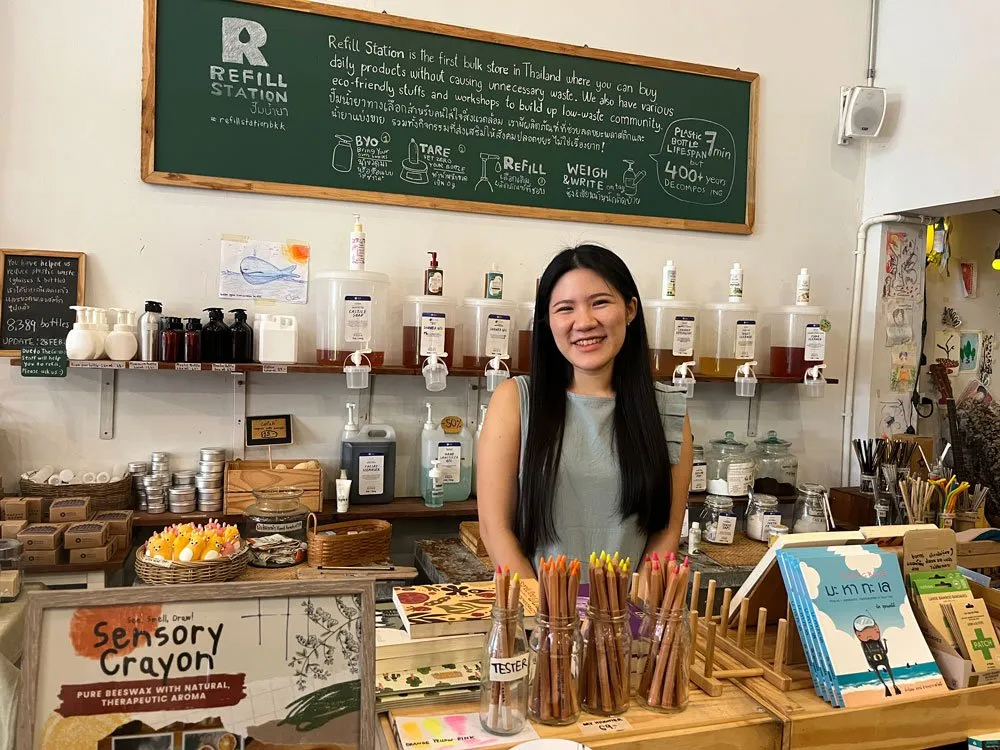
How can you care for the Earth every single day?
In her youth, Pear would reunite with her friends Supatchaya “Ann” Techachoochert and Chanin “Nammon” Srisuman at eco-camp outside of Bangkok, where their collective passions for saving the world would reach a fever pitch—only to gradually die off for the rest of the year.
As Pear put it, it felt like they had “an on-and-off relationship with the Earth.” Although the three eco-musketeers grew from mere participants to camp organizers, their commitment to environmental conservation was on unsteady footing.
“The big question was how we could care for the planet while in Bangkok,” she recalls, or in other words, how can people sustain their relationship with the environment each and every day?
Even when Pear was an industrial design major at Chulalongkorn University, the plastics crisis was hotly discussed. So when they stumbled on the idea of a zero waste store in 2017, she gave it the instant green light. The three friends finally founded Refill Station in 2018 inside the Better Moon Guesthouse & Cafe. They would hardly realize how this humble shop would plant the seed for the zero waste movement in Thailand.
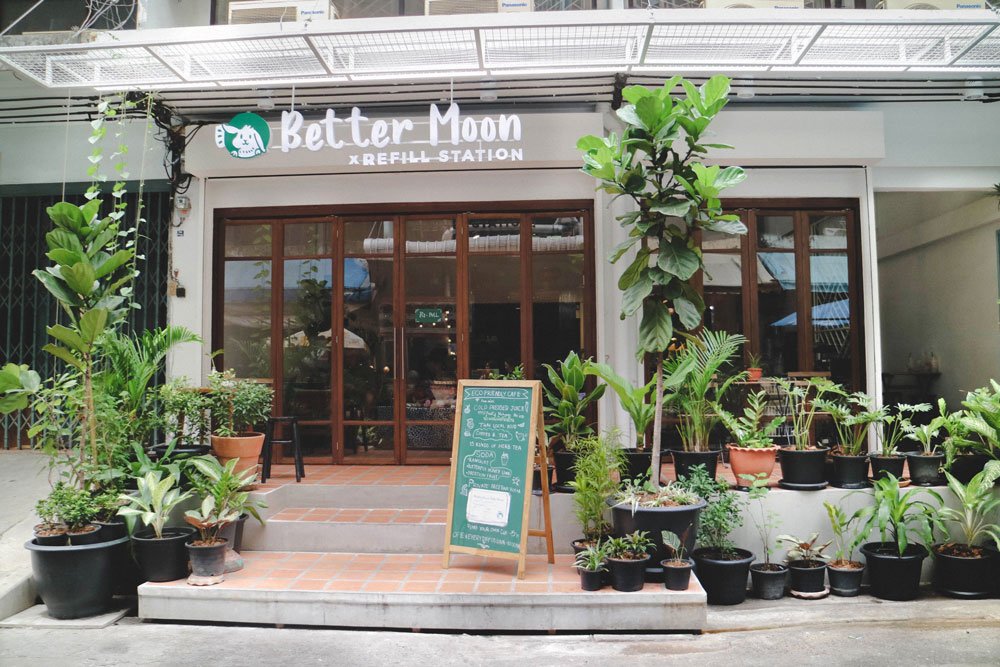
When you enter Better Moon x Refill Station, you’re greeted by shelves of dispensers filled with a wide variety of everyday household and personal care products, ranging from laundry detergent to tooth tabs. There is also a dry food corner offering dried foods like pasta and dry peas. Customers are encouraged to bring their own reusable containers and fill them with whatever they need.
Naturally, products on the store’s shelves are well curated to ensure they align with Refill Station’s mission. For instance, the shower gel from Hug Organic is a local brand whose mission is to create products that are gentle to both the skin and the environment by using almost 100% natural ingredients and recyclable packaging. Another example is Cheww.co, Thailand’s first brand for plastic-free toothpaste tabs.
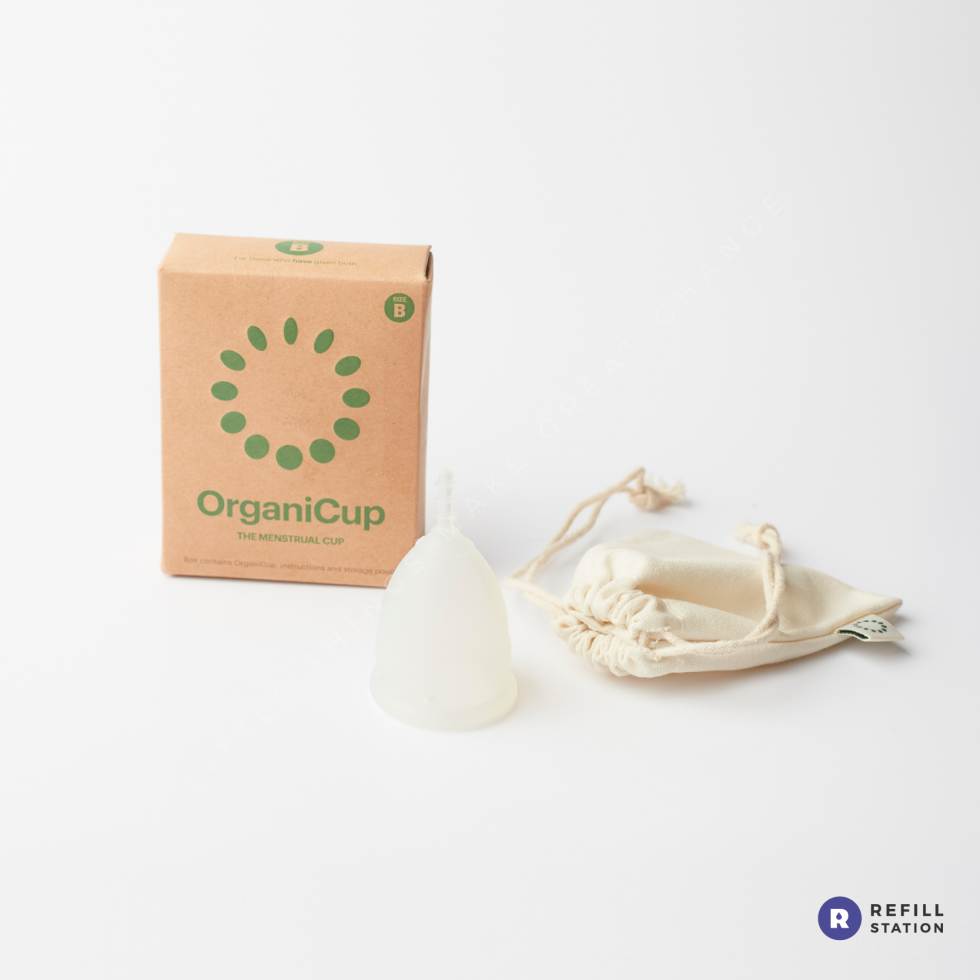
Aside from refill services, the store provides useful eco-friendly gear that enables people to live a zero waste lifestyle. According to an Ocean Conservancy report, plastic straws are one of the top 10 items being dumped into the ocean. At Refill Station, customers can stock up on alternative straws made of stainless steel, bamboo, or silicone.
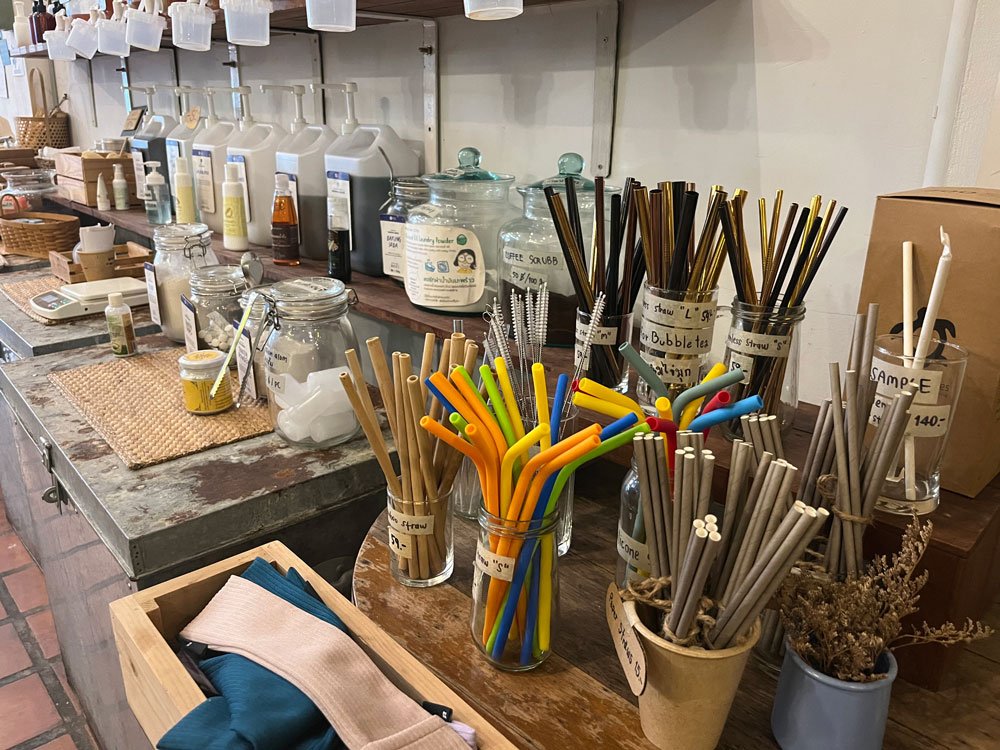
A “zero-waste period” section offers sustainable menstrual products such as the OrganiCup—an alternative to disposable pads, which reportedly contain up to 90% plastic.
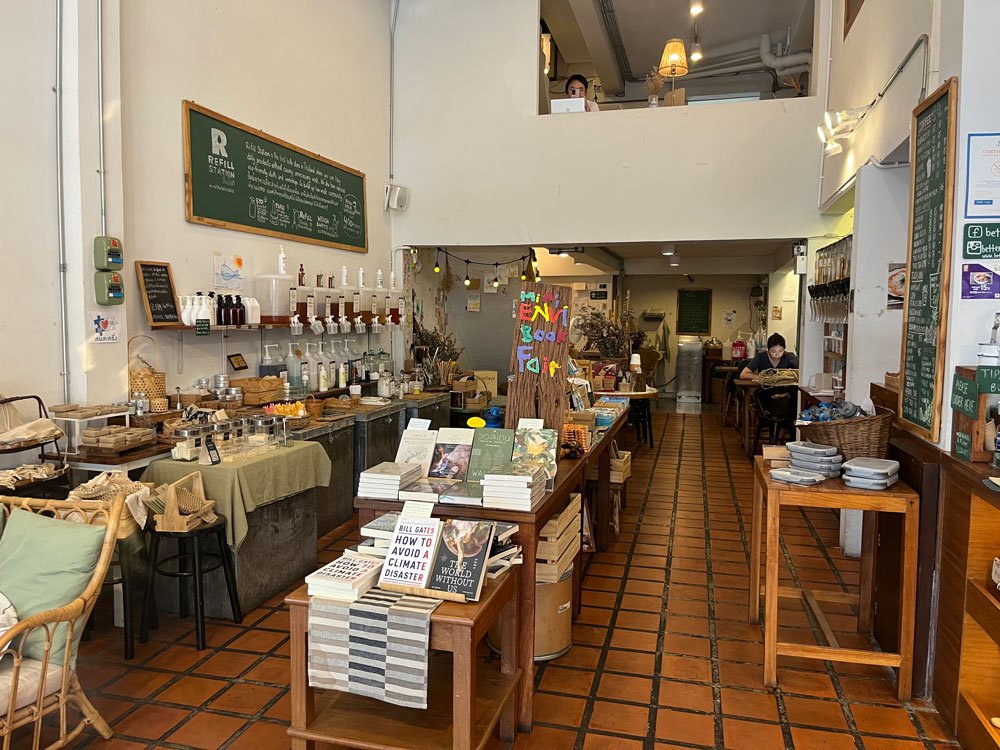
The “Mini Envi Book Fair” is the newest addition to the store, meant to empower people to inform themselves on environmental issues from authoritative sources.
“Knowledge is of immense importance. We continuously promote education on the environment- and climate crisis-related fields.”
She also sees educational institutes as an important driver of the zero waste movement. Several schools and universities have reached out to the Refill Station to host and give lectures on environmental conservation.
She recalls there was a married couple visiting the store because their seven-year-old child, who had been there on a school trip, suddenly banned plastic bags in the house.
“Not all green-conscious people hold signs and protest; we simply refuse ketchup packets.”
Although Refill Station may be referred to as a “zero waste” store, Pear’s attitude is not nearly so absolute.
“It’s not mandatory to hit ‘zero’,’” she says, explaining that a drastic shift to a zero waste lifestyle may discourage people from taking steps to live green.
Instead, she recommends starting from tiny changes to daily habits, such as ditching a regular plastic toothbrush for a wooden one. The key is to find simple alterations that can be seamlessly integrated into our everyday life.
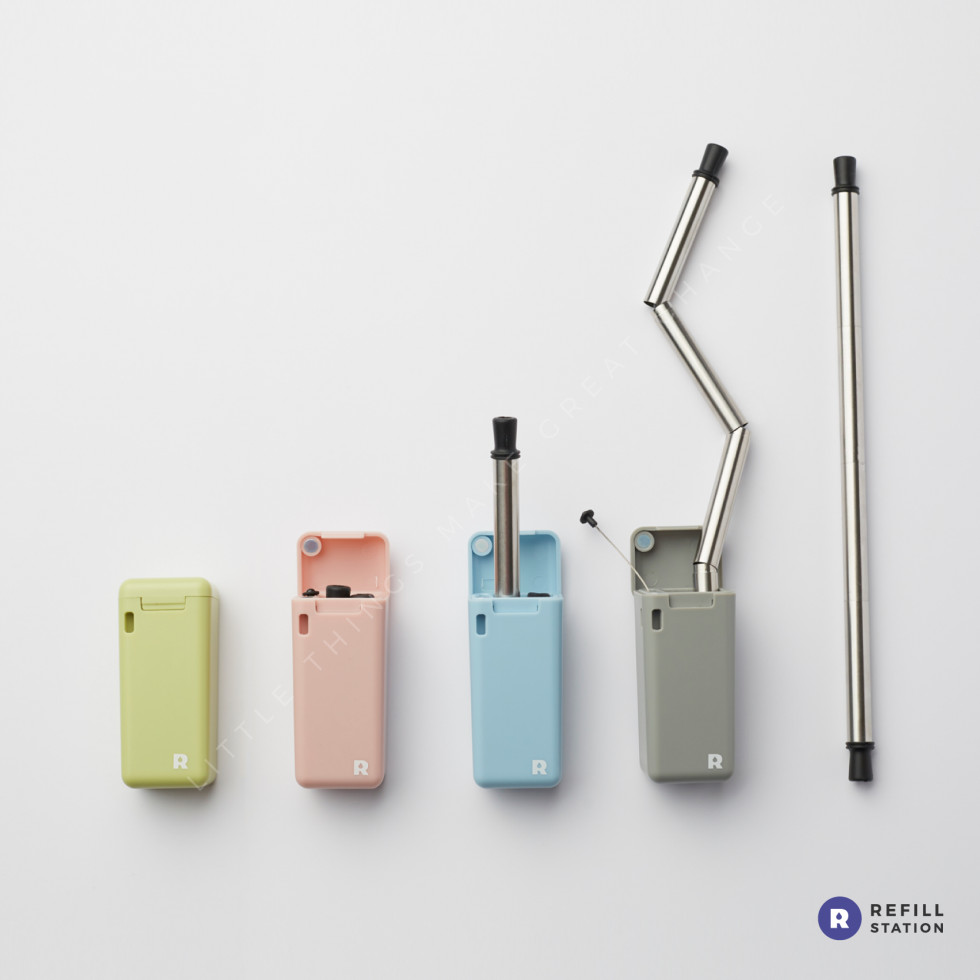
According to Pear, the efforts are likely to last longer and people will feel more comfortable about eliminating waste. As Refill Station says on its website, #LittleThingsMakeGreatChange.
Reducing plastic waste might be Refill Station’s main goal, but its co-founder was also determined to create a safe space for eco-conscious consumers to shop and share their thoughts. She believed there were some misunderstandings and misconceptions, not just about environmental issues, but the people who care about them.
“Not all green-conscious people hold signs and protest; we simply refuse ketchup packets,” Pear says. “There may be a lot of like-minded people out there but we have no place to voice our interest.”
“It used to be why; now it is how.”
Over the years, she’s also noticed a paradigm shift in her visitors’ attitude towards green consumption. “It used to be why; now it is how,” Pear explained.
Fewer people are asking about the reasons for making the switch to sustainable products and more about what options are available to them. Since establishing the zero waste store, the co-founder was surprised to find how many people share the same ideals, with some walking in with luggage full of empty bottles to be refilled.
But it wasn’t always smooth sailing.
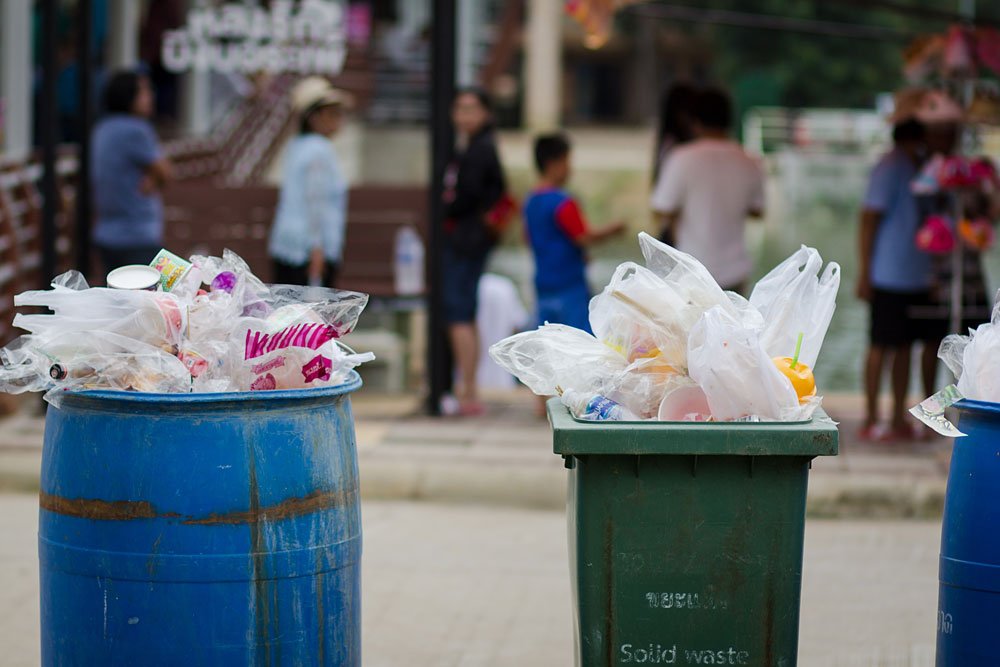
Source: Songyos Ruensai / Shutterstock.com
Better Moon is surrounded by several restaurants and street food stalls, so many patrons would bring in takeaway food often served in plastic containers, bags, or other materials that Refill Station has been trying to eliminate. This disturbed Pear, but she didn’t want to ban takeaways altogether.
Instead, she implemented a new store policy that allowed patrons to bring in food, but only if they used the store’s plates, setting up a table of complimentary flatware. Customers appreciated the service, and many vendors took notice. Nearby restaurants and street hawkers began reducing plastic waste at their venues, with some even bragging to Pear that they had made the switch to paper plates.
“We cannot force people to change their behavior, but we can try offering better solutions,” Pear concludes.
When asked what advice Pear has for living more sustainably, she asked that people think about which aspect of their daily lives they’d be willing to change.
“We all have different approaches to green living. Write your own rules that work for you. Don’t be too hard on yourself and, at the same time, don’t judge other people.”
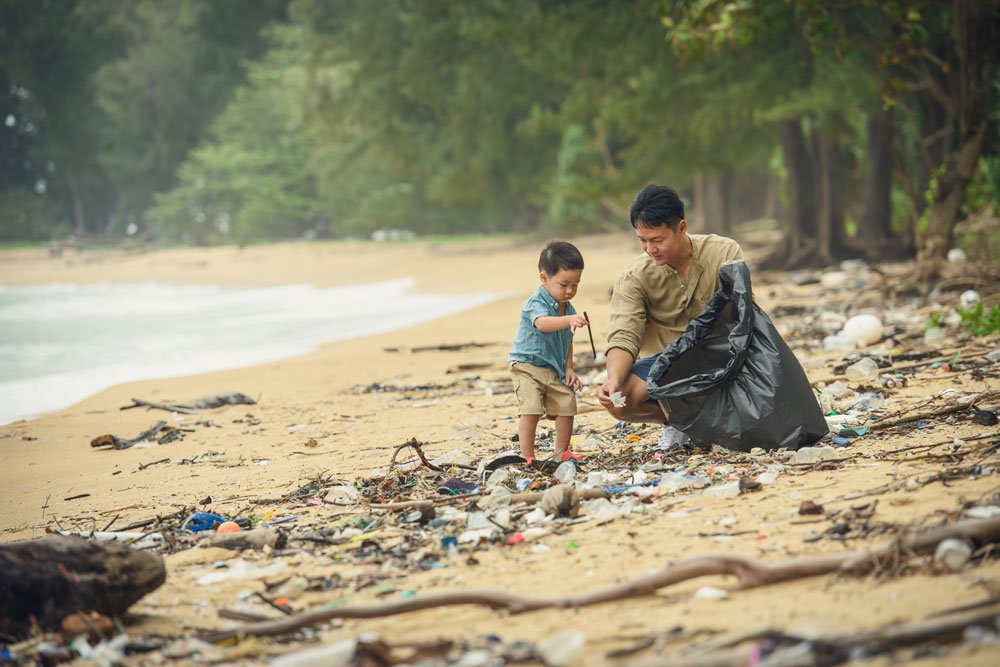
Source: sutlafk / Shutterstock.com
Up until today, Refill Station has filled up over 10,000 bottles. Given that single-use plastics are responsible for 89% of all plastic waste in the ocean, Pear and co-founders have prevented 10,000 pieces of plastic from hurting marine animals and polluting their marine ecosystems.
Learn more: Reducing Thailand’s Plastic Footprint with Traditional Wisdom
Less obvious is the impact they’ve generated. Over the years, Refill Station and its founders have inspired many to follow their footsteps. There are now over a dozen waste-less stores in Bangkok alone and more in other provinces such as Chiang Mai and Phuket. Brands like Yves Rocher (🇹🇭) and Siam Discovery’s Ecotopia (🇹🇭)have both introduced their own “refill stations.”
Entrepreneurs from other provinces in Thailand as well as other Southeast Asian countries have visited the store, seeking business advice. And they have come to the right place.
“We are more than willing to share what we have learned through years of experience with those sharing mutual vision. I am happy to see zero waste stores popping up across Thailand.”
As the zero waste movement picks up in Thailand, it’s becoming easier all the time for people across the country to choose to care for the Earth, every single day.
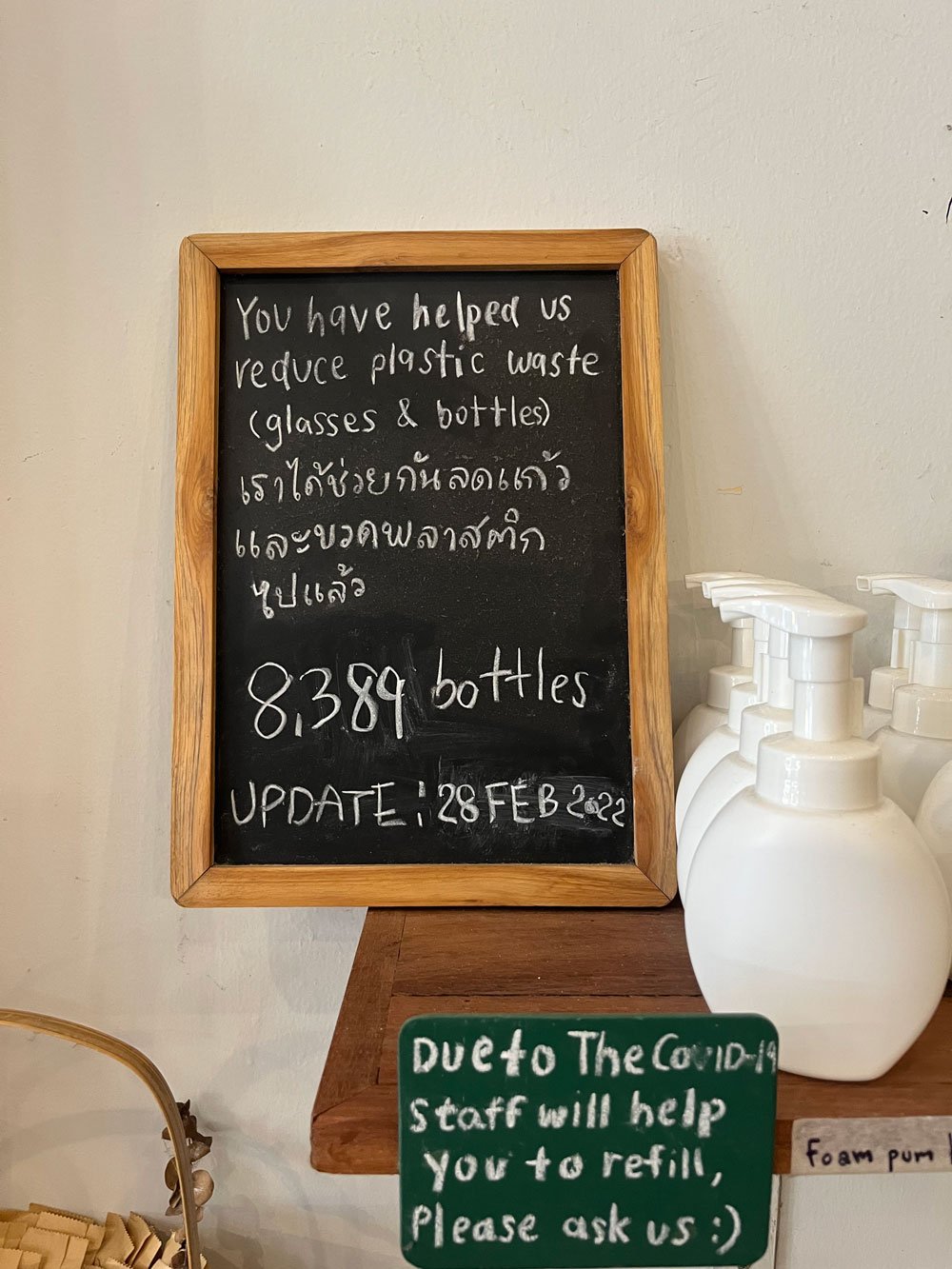
About the Author:
Natcha Jantararotai
A writer, translator, and avid reader, Natcha, or Lha, works in the field of digital diplomacy at a foreign government organisation. Aside from her interest in cross-culture communication, she is passionate about storytelling and how creativity can be used as a tool to inspire groundbreaking solutions. Her love for nature and the urge to support local communities play a crucial role in her writing pieces.
Original article appears on Thailand Now Website: https://www.thailandnow.in.th/life-society/icon-now-refill-station-pioneers-zero-waste-movement-in-thailand/